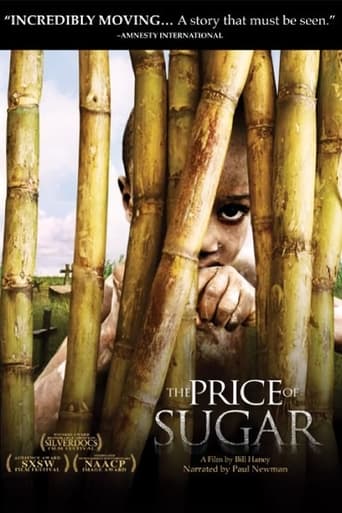Seamus2829
If you have the same contempt for the ruling classes as I have,then this documentary (shot on video)is for you. It has to do with Haitians, who are forced to work in the Dominican Republic,cutting sugar cane for slave wages,who are treated like human cattle by brutal overseers, all for the wealthy sugar cane plantation owners (does the word exploitation strike a familiar chord here?). The documentary is largely centered on a Catholic Priest,who out of concern for these people,acts as a spokesman for their well being (while all the time making an enemy out of himself for the more xenophobic Dominicans). I generally walked out of this one at the end feeling sadness & pity for the downtrodden workers who are constantly being exploited,and burning disgust for the perps who should know better. The doc is narrated by the great Paul Newman (never once seen on camera,but his voice is in plentiful supply). This is a documentary that is a "must see" for human rights advocates,and just about anyone with a human heart.
dmacias666
I recommend this film for all people who are fearful of immigrants. I am sure that you will find the absurdity in the fear the Dominicans feel for Haitians. These two groups resemble one another that it boggle the mind that they fail to see that they have many attributes in common. If you come away with this same observation then asked yourself what sets you apart from any immigrant group. They want what you want, and they have the same needs. The differences between them and US citizens will evaporate in a single generation.The Haitian hate groups should be ashamed of their behavior, but no more than any American-first organization. We live in the same world, we breath the same air, and we share a common DNA. And like the Xenophobic Haitians, you benefit from the labor of immigrants.The son of an immigrant woman
normantjr
I haven't seen the movie. But I will. A free market doesn't rely on hundreds of millions of dollars of annual subsidies to prop up a business, as the sugar industry does. In fact, the sugar industry in the U.S. has contributed significantly to Florida's environmental degradation. They have horribly disfigured our democracy and they have influenced greatly our foreign policy towards Cuba, completely counter to American public opinion. A previous commenter must have some personal interest in the sugar industry, or they are completely ignorant as to the realities of what a true free market is. If the previous commenter who bashes the movie was honest and had some integrity they would turn their venom towards the sugar industry in Florida from which our citizens suffer the pollution of our democracy and the defiling of our environment. The history and truth is right there for anyone to read. See the movie.
xochristinaxo16
I have worked in these sugarcane fields, helping the people working there. I have seen and been told things that "researching" will not tell you. Of course living in the Dominican and getting attached to the Haitians you are going to have a bias especially if you're making a documentary. These people at times are forced into going to the Dominican. There are Dominican officials that there job is to find Haitians and bring them over. They are told that they are getting a good paying, decent job and then they are brought to the fields and aren't allowed to leave. There are guards with guns or machetes stopping them from leaving. How is that not slavery? Maybe before you go after a film you should visit and live in the culture and situation that is being filmed.


